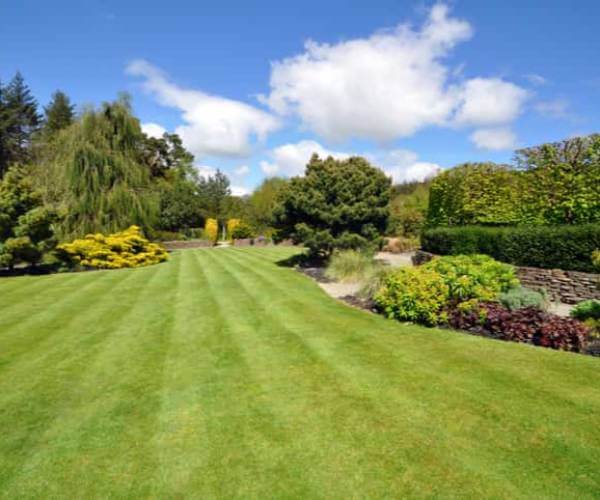- Lawn Turf
- Artificial
- Soil
- Timber
- Composite Decking
- Paving & Stone
Get In Touch With Our Experts Today!
Give us a Call! - Seed & Fertiliser
- Dressing
- Bark

February 12, 2024
With the long-awaited Spring just around the corner, it’s time to start thinking about all-things gardening, particularly lawn turf.
Choosing the right lawn turf for your garden involves considering various factors such as climate, soil type, maintenance requirements, and the intended use of the lawn. But, with so many options available, navigating the world of lawn turf and making the right choice for your next project can be overwhelming.
Here’s a guide to help you make an informed decision and prepare your lawn for the upcoming season.
Considering the climate in your garden is crucial when choosing lawn turf. Different varieties have specific climate preferences and requirements for optimal growth. Factors such as temperature, precipitation, sunlight, and humidity all play a significant role in the health and performance of your lawn.
By selecting turf that matches your climate, your lawn turf is more likely to establish strong roots, resist stressors, and provide a lush, green lawn that enhances the aesthetic of your outdoor space.
The characteristics of your soil, such as texture, composition, and drainage, directly impact the health and performance of the turf. Different lawn turf varieties have specific soil preferences; some lawn turfs thrive in sandy soil, while others prefer loamy or clayey soil.
Assessing the soil type in your garden is essential for selecting lawn turf. By understanding the characteristics of your soil, you can make informed choices that contribute to a healthier, more resilient lawn with improved long-term performance.
Turf prices can vary, so establish a budget that aligns with your landscaping goals. By setting a budget, you can select turf varieties and maintenance practices that create a beautiful lawn and ensure long-term sustainability without exceeding your financial constraints.
Our easy-to-use lawn turf calculators will help you quickly calculate just how much turf you need for your project.
Thinking about maintenance is crucial when choosing lawn turf for your garden. This is because the level of maintenance required can significantly impact the appearance, health, and sustainability of your lawn. Different lawn turf varieties have varying maintenance needs. Selecting turf that aligns with your maintenance preferences and capabilities can lead to a more prosperous and enjoyable gardening experience.
Whеthеr уоu аrе lооkіng to revamp your gаrdеn оr еnhаnсе thе look оf уоur соmmеrсіаl рrореrtу, our range of high-quality lawn turf grown in Yorkshire, Lincolnshire, Cambridgeshire, Suffolk, and Kent is perfect for your next landscaping project.
Made from a precise blend of 75% fescue and 25% rye, Trident Turf is weed-free and boasts excellent sward density to ensure it thrives amidst the UK’s unpredictable climate.
Meticulously cultivated and delivered on the same day, Trident Turn guarantees instant lushness, promising a flourishing, reliable lawn – every single time.
Unlike traditional lawns that typically consist of uniform grass species, wildflower turf is designed to create a more natural and diverse landscape, mimicking the appearance of a meadow or natural grassland to attract insects, birds, and other wildlife.
Our Wildflower Turf contains 27 different perennial and annual seeds that will flower throughout the Summer. It creates a stunning, eco-friendly habitat for wildlife, including bees, butterflies, birds, and small mammals.
Grown on natural sands, our Greens Turf is expertly cultivated for use on golf courses. It provide a smooth, fast, and consistent playing surface that meets the expectations of golfers. Regular maintenance practices, including precise mowing, aeration, fertilisation, and pest control, are essential to ensure the health of this lawn turf variety.
Distinguished by its ability to produce rhizomes, which enables it to fill in bare spots, recover from damage, and create a dense and resilient turf stand. Our RTF Turf often exhibits a fine leaf texture, contributing to a lush and attractive appearance.
Typically, traditional tuft doesn’t thrive in heavily shaded areas. In shaded conditions, grass growth may be slower than grasses in full sunlight. Shade-tolerant varieties are often more patient and able to withstand slower growth rates.
Our shade-tolerant turf is ideal for use where buildings, trees, or other structures create shade. This makes it challenging for traditional grass varieties to grow well.
Spring is generally an ideal time for lawn turf installation. It’s essential to consider climate variations, soil type, and maintenance requirements. By taking the time to assess these factors, you’ll be well on your way to enjoying a lush and vibrant lawn that enhances the beauty of your outdoor space.
Need some extra help choosing the right lawn turf for your next project? Speak to our friendly team here.
CALL US NOW ON 01234 818 253